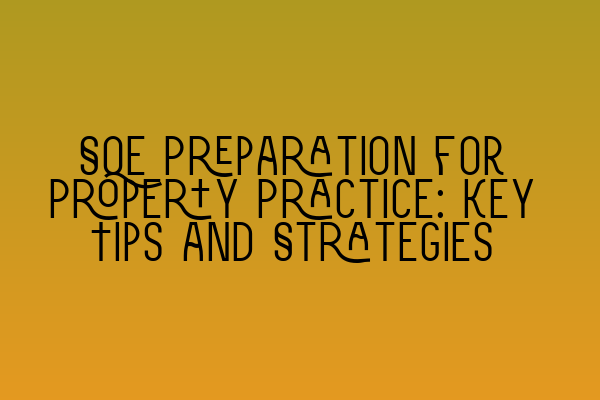**SQE Preparation for Property Practice: Key Tips and Strategies**
Are you considering a career in property law? Perhaps you have heard about the new Solicitors Qualifying Examination (SQE) and want to make sure you are fully prepared to excel in property practice. Look no further! At SQE Property Law & Land Law, we are here to guide you through the essential tips and strategies to help you succeed in your SQE preparation and ensure you have a strong foundation in property law.
**Understanding the SQE**
The SQE is a new centralised examination introduced by the Solicitors Regulation Authority (SRA) in England and Wales. It aims to provide a consistent and fair assessment of the knowledge and skills required to qualify as a solicitor. The SQE consists of two stages: SQE1 and SQE2.
SQE1 covers a wide range of subjects, including property law, land law, contract law, public law, and more. To pass SQE1 and excel in property practice, it is crucial to have a solid grasp of property law concepts, principles, and relevant legislations.
**Building a Strong Foundation in Property Law**
1. **Master the Fundamentals**: Start your SQE preparation by focusing on the core principles of property law. Understand the concepts of land, ownership, possession, and title. Become familiar with key statutory provisions, such as the Law of Property Act 1925 and Land Registration Act 2002.
2. **Stay Up-to-date**: Property law is constantly evolving, with new legislations and cases shaping the legal landscape. Stay updated with recent developments in property law by regularly reading legal journals, attending webinars, and following relevant blogs and social media accounts. This will demonstrate your commitment to continuous learning and your ability to apply the law in real-world scenarios.
3. **Practice, Practice, Practice**: Practice makes perfect! Solve as many property law case studies and practice questions as possible. This will help you develop your analytical and problem-solving skills, as well as familiarize you with common scenarios and legal arguments in property practice. Focus on both theoretical knowledge and practical application.
4. **Take Advantage of Resources**: Utilize a combination of resources to enhance your property law understanding. Consult textbooks, study guides, online courses, and reputable legal websites. Ensure you have access to reliable and authoritative sources that cover property law comprehensively.
5. **Seek Professional Guidance**: Consider enrolling in a specialized SQE preparation course or seeking guidance from experienced property law practitioners. Their insights and expertise can provide you with valuable tips, exam strategies, and industry-specific knowledge to excel in property practice.
**Effective Exam Strategies**
1. **Read and Understand the Question**: Carefully read and analyze each question to ensure you understand what is being asked. Identify the key issues and formulate a structured and concise response. Pay attention to any specific legal principles or legislation mentioned in the question.
2. **Time Management**: Time management is crucial in the SQE examination. Allocate a specific amount of time for each question and stick to it. If you encounter a particularly challenging question, don’t get stuck. Move on and come back to it later, ensuring you have attempted all other questions within the allocated time.
3. **Structure Your Answers**: Organize your answers in a clear and logical manner. Use headings, subheadings, and bullet points to present your arguments and analysis effectively. This will make it easier for the examiner to assess your answer and ensure you provide a comprehensive response.
4. **Use Relevant Case Law and Legislations**: Refer to relevant case law and legislations in your answers to demonstrate a strong understanding of property law. Cite the names of relevant cases, statutes, or sections, and explain how they support your arguments. This will illustrate your ability to apply legal principles to the facts of the case.
5. **Proofread Your Answers**: Before submitting your answers, take the time to proofread and edit them. Check for any grammatical or typographical errors. Ensure your answers are concise, coherent, and convey your points effectively.
By following these key tips and strategies, you can greatly enhance your SQE preparation for property practice. Remember, success in the SQE doesn’t just depend on memorizing information but on understanding and applying property law concepts effectively. Good luck with your SQE preparation journey, and we hope to see you excel in the exciting field of property law.
